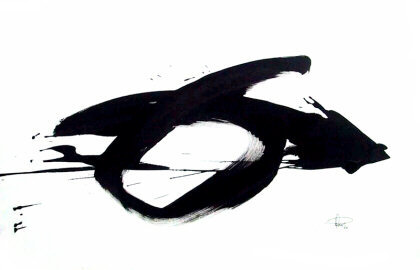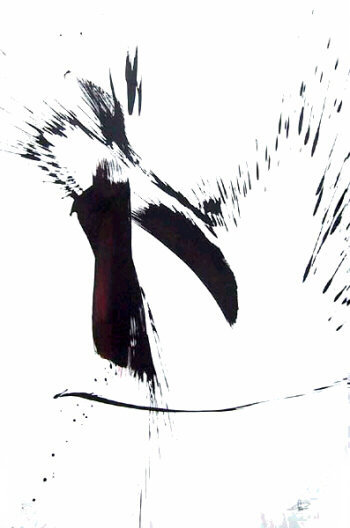 One of the first things I noticed in working with my anger at Shakey was that it had little to do with the physical sounds that he was making. One morning, a truck (propane? gas?) parked itself right outside the meditation hall and made a truly irritating noise, whining and varying its pitch, for about half an hour. I had no problem. The truck was just doing what it had to do, the motors were running the way they were supposed to, and, while perhaps an unfortunate bit of timing, it was really no big deal. It was actually kind of funny -- here were a hundred people, coming from all over the world for some silence, and then a truck parks right next to them and whines. Loudly.
One of the first things I noticed in working with my anger at Shakey was that it had little to do with the physical sounds that he was making. One morning, a truck (propane? gas?) parked itself right outside the meditation hall and made a truly irritating noise, whining and varying its pitch, for about half an hour. I had no problem. The truck was just doing what it had to do, the motors were running the way they were supposed to, and, while perhaps an unfortunate bit of timing, it was really no big deal. It was actually kind of funny -- here were a hundred people, coming from all over the world for some silence, and then a truck parks right next to them and whines. Loudly.
So, I noticed (in a bit of discursive thinking that probably counts as 'bad' behavior), that it was really the story of Shakey, as much as the sound. In particular:
- There is the sense of volition on the part of Shakey, but not the truck. Ostensibly someone could=ve scheduled the truck delivery for a different time, but, really, deliveries are just part of the process. And certainly, the truck's not doing anything "wrong." But Shakey -- he was either in delusion, or was very inconsiderate. Either way, he was the problem. Trucks are not inconsiderate.
- While the truck was a temporary problem, Shakey was long-term. And I was powerless to do anything about it, due to the nature of the practice itself. I couldn't tell him to stop moving. I couldn't really complain to the teachers -- they'd probably just tell me to watch my mind and note my anger. I just had to sit there and take it, every day.
- And it seemed so unfair. Why should I sit there and take it, while he, a lousy, inconsiderate jerk, gets to go along his merry way, oblivious to the harm he's causing? I was being disciplined, and he was being a putz.
Believe me -- this was just scratching the surface. As I wrestled with the anger I felt for Shakey, I came up with no fewer than fifteen independent reasons why I was so angry at him. Each one was not only compelling, but had the ring of insight around it -- like that point about powerlessness, that that was what it's really about.
Also, I wasn't always angry at Shakey. I had a lot of compassion for him at times, because if you keep moving around like that, you never gain the stillness of body and mind necessary for deep concentration, inner peace, and spaciousness of mind. Those were qualities I was able to cultivate, and they are so beautiful I was sad on Shakey's behalf. So it's not like I always had the same reaction.
None of these supposed insights worked. Figuring out why I was angry, which seems like the conventional approach to anger, was having no effect on ameliorating the anger. There were at least four reasons why not. First, there were too many causes to count; who could really be sure which were the most important ones? Second, the psychoanalytic assumption that knowing the reasons for a feeling lessen its hold -- just didn't seem to be true. Instead, probing all these causes for anger, I was really proliferating a lot of thoughts and elaborations of the anger. I just got more and more frustrated, at the rules of retreat, at the injustice of it, and so on. Third, I observed that sometimes the causes led to one result, and sometimes to another, suggesting that understanding the causes was not sufficient for understanding the phenomenon of anger. And fourth, what's the point of knowing the causes anyway? To evaluate anger? To judge it, or perhaps to judge others according to whether or not what they're doing is OK? Is that really helpful? I mean, it's not as though my rational mind is in control when I'm angry. Telling myself that I shouldn't be angry right now.... that's not going to help.
So much for conventional ways of working with anger. As I observed in my journal, going into all the reasons may produce some pleasant sensation of "figuring it out," but no results in changing my response to the stimulus, or living with the response if it can't be changed. In fact, the story actually makes it worse.
Several Buddhist ideas about anger failed also.
First, I tried to will myself to be more compassionate. That never works. Buddhist compassion isn't Western compassion -- it's not something you ought to do, and not about conforming your will to a set of rules. Rather, it's meant to be a compassion that arises naturally from clear seeing of what is happening at any moment. This compassion has none of the tension of discipline around it, and, as I wrote about last month in Zeek, it's very beautiful to discover that each of us has it. Really: just stop clouding the mind with thoughts and delusions, and you are naturally compassionate. But trying to get it to work led to tears.
Second, I tried repeating various teachings and stories, to no effect. Shakey's being "inconsiderate," if that's what he was being -- that's just at the level of the self. Really, there's no separate self there to be inconsiderate; what I was calling "Shakey" was really just a ball of causes and conditions. And there's no separate self here to be offended. No self, no problem, right? Well, right in theory, but wrong in practice, if the no-self doctrine is used as yet another billy-club to beat up Jay and his incorrect feelings. Truth is not a billy-club, and kicking your own ass is not the way to liberation.
 Third, I really tried to just feel the anger-energy and be equanimous with it. There's a little trap within the Buddhist-Jewish synthesis that I practice, because the Buddhist Reality is just "What Is" where as the Jewish Reality is both What Is and What Ought. God is Ought, and it's easy to anthropomorphize that Ought into an Ought-We-Understand or Ought-We-Want. Clearly, though, God's Ought doesn't work that way. Kids get cancer, the holocaust happened -- this is not an Ought in the way we usually use that term. So, I tried to release my own, more trivial sense of Ought. This is just
how it is. But this, too, often felt like a scolding.
This is how it is, and so you shouldn't get upset about it.
Third, I really tried to just feel the anger-energy and be equanimous with it. There's a little trap within the Buddhist-Jewish synthesis that I practice, because the Buddhist Reality is just "What Is" where as the Jewish Reality is both What Is and What Ought. God is Ought, and it's easy to anthropomorphize that Ought into an Ought-We-Understand or Ought-We-Want. Clearly, though, God's Ought doesn't work that way. Kids get cancer, the holocaust happened -- this is not an Ought in the way we usually use that term. So, I tried to release my own, more trivial sense of Ought. This is just
how it is. But this, too, often felt like a scolding.
This is how it is, and so you shouldn't get upset about it.
Finally, I tried to "meet my anger with love." When I couldn't feel love for Shakey, I tried feeling love for Jay. I followed the practice of the Maggid of Mezrich, a founder of Hasidism, who said that when unwanted thoughts arise, take them to their root. If you're praying and thinking of sex, don't just repress the sexual thought -- elevate it. Realize that you are desiring beauty (tiferet) or love (hesed), and elevate your desires to the Source of beauty and love. Likewise, if anger arises, see that it is arising because I want to do the right thing. I want to open my heart in meditation. My stories of just desert (I deserve better than this) come from trauma, and years of repression, and how I experienced childhood. The anger is pain -- meet it with love.
That almost worked, but then I'd get lost again.
So, neither the modes of Western psychoanalysis nor Buddhist meditation nor even of Buddhist-Jewish spirituality seemed to be working for me. I spent day after day encountering anger in the meditation hall. I sat elsewhere when I knew Shakey would be there. I surrendered to Shakey's noises when there was no alternative. And I felt like a failure.



Shakey: An Essay on Anger
Jay Michaelson
Giving Thanks to Elijah the Prophet in Indian Manhattan
Jonathan Schorsch
Three Nights
Jill Hammer
The Pursuit of Justice
Emily Rosenberg
Sha'arei Tzedek
Dan Friedman
God's Unchanging Hand
Daniel Cohen
Archive
Our 610 Back Pages
Neurotic Visionaries & Paranoid Jews
April 7, 2005
Zeek in Print
Fall/Winter 2004 issue now on sale
About Zeek
Mailing List
Contact Us
Subscribe
Tech Support
Links
From previous issues:
Erev
Temima Fruchter
Carrying Light into Dark Times
Rabbi Zalman Schachter-Shalomi
The Mall Balloon-Man Moment of the Spirit
Dan Friedman